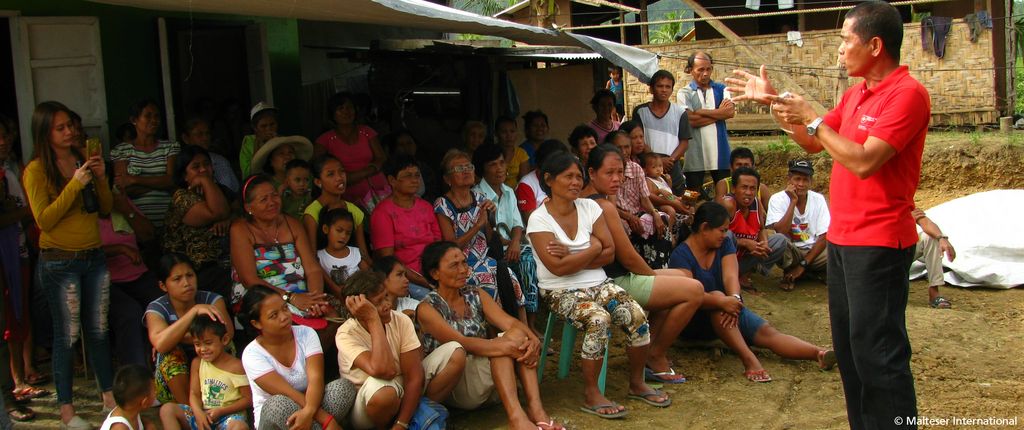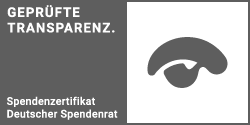
Promoting inclusion and improving access to water and sanitation in Eastern Visayas
Recurrent natural disasters have made the Eastern Visayas region one of the most disaster prone areas in the Philippines. Frequent typhoons have led to heavy loss of life and destruction of livelihoods. In December 2015, the already vulnerable population was hit by typhoon Nona, killing 51 people and destroying over 300,000 homes.
These disasters have taken their toll on the region. In the province of Northern Samar, over 50% of the population live under the national poverty line, with only two-thirds having access to clean drinking water. Many sources of drinking water and sanitation have been destroyed by the natural catastrophes leading to high rates of diarrhea and malnutrition.
After the typhoon in December 2015, Malteser International initially supplied affected households with hygiene kits and other necessary materials. Over 600 families were also supported in the reconstruction of their destroyed homes.
Between 2016 and 2018, our capacity buuilding training in disaster risk reduction helped the local population in two municipalities, Catarman and Laoang to better prepare for future disasters. Our work in the region which has an emphasis on the integration of persons with disabilities, elderly people, women and children, was expanded in June 2018 to include activities aimed at improving access to clean water and overall hygiene and sanitation condition in communities and schools.
Many schools in Catarman and Laoang lack adequate access to water and sanitary facilities. This can have serious health and educational consequences for school children, especially young girls. Because schools are used as evacuation centres during natural disasters, these inadquate facilities become overburdened during emergencies, increasing the risk of diseases. While the Philippine legislation clearly requires barrier-free access to facilities for people with disabilities and other vulnerable groups, implementation of these regulations has been slow, making access to water and sanitation difficult for the groups.
Alongside insufficient access to clean drinking water and sanitary facilities, waste management and disposal pose a major environmental problem for the community. Although waste collection and recycling lie within the responsibility of the local authorities, practical implementation is either inadequate or non-existent. In the midst of these challenges, people with disabilities and other vulnerable groups are particularly affected, as their special needs are not taken into account in community development planning.
The project aims to strengthen the capacities of 13 communities in the municipalities of Catarman and Laoang in Northern Samar in the field of disaster risk reduction, water, sanitation and hygiene, thereby improving their resilience when faced with natural disasters in the future.
- Improved water and sanitation facilities and school hygiene in 13 barangays or villages in the municipalities of Catarman and Laoang in Northern Samar
- Better access to safe and barrier-free evacuation centres during natural disasters for communities
- Inclusive community development planning and awareness raising on inclusion
- Improved water, sanitation and hygiene services in the communities through inclusive community development planning and participatory awareness raising.
- Training communities and local authorities in the practical application of laws on accessibility, inclusion and community-based inclusive development
- Training and counselling of communities and local authorities in the integration of needs in the areas of WASH and inclusion in the annual community development plans
- Guidance for people with disabilities on applying for state benefits and networking at community level and with other stakeholders in the region
- Construction of barrier-free water and sanitation facilities at 13 schools
- Training of school management in the proper usage of schools as evacuation centres
- Establishment and training of WASH Peer Educator Clubs at schools
- Promoting public awareness on hygiene in schools and communities, as well as waste collection
- Training of communities, authorities and schools in waste management
- Support for communities, schools and authorities in improving local waste management
- Support for small-scale projects in the field of water, sanitation, and hygiene (WASH) in the municipalities
Country info
Capital: Manila
Area: 300,000 km²
Population: approx. 101 million
Project data
Project duration: June 2018 - June 2020
Partners: Philippine Association of the Order of Malta
Financing: Germany's Relief Coalition (Aktion Deutschland Hilft), private donors
Last udpdated: September 2019








